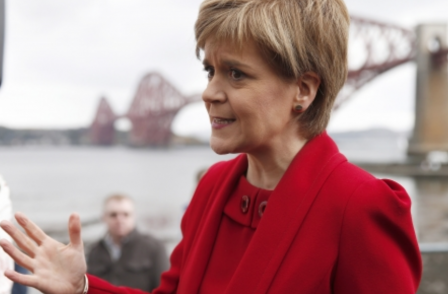
Scotland must get a dedicated BBC television channel to counter the often "ill-informed" coverage of London-based journalists who have "totally failed" to cover constitutional change, First Minister Nicola Sturgeon has demanded.
As a minimum, Sturgeon called for BBC editors based within Scotland to have greater ability to influence UK reporting, a specific Scottish site for iPlayer programmes, Scottish Parliament oversight for the BBC in Scotland, greater use of Scottish opt-outs, and more powers for the BBC commissioners based in Scotland, during her Alternative MacTaggart lecture at the Edinburgh International Television Festival.
Sturgeon insists she does not believe the BBC's coverage of the referendum was biased, but said BBC network journalists flown in during the final stages of the campaign "sounded less than fully informed".
Her proposals would make the next BBC charter, which is due to run until 2027, fit for purpose "for many years to come – whatever our future constitutional relationship may be", she said.
Sturgeon has not ruled out holding another independence referendum in near future if the political circumstances change significantly from the No vote in September 2014.
She accused the BBC of following the agenda of the anti-independence print media during the 2014 campaign, and lapsing into "partial and, at times, pejorative" coverage.
She said: "To some people, a journalist not appearing to be fully informed can sound like a journalist not being entirely impartial.
"I know that some people might choose to interpret what I say as me accusing broadcasters – and, let's be frank, the BBC in particular – of being biased in how they covered the referendum.
"So let me be clear. I am not saying there was institutional bias in the BBC's referendum output.
"However, there were occasions when its coverage – through oversight, apparent ignorance of the detail of an issue or as a result of simply following the agenda of openly partisan print media – lapsed from the objective output the referendum deserved into what could seem partial and, at times, pejorative."
The BBC's Audience Council for Scotland said that BBC network programmes "did not engage with the issues until too late a stage, and that meant some had been less well informed, and that this diluted the value of the coverage at both Scottish and UK levels".
Sturgeon said: "The BBC needs to reflect the nations and regions of the UK much more effectively than it does. It is after all the national broadcaster for Scotland, England, Wales and Northern Ireland.
"In Scotland, less than half of the audience thinks that the BBC accurately reflects their lives in terms of its news and current affairs coverage.
"Scotland is the only part of the UK where that's the case."
She added: "Responsibility for broadcasting in Scotland should transfer from Westminster to the Scottish Parliament.
"To those who say this is about the SNP wanting to exert political control over the BBC, I say that is arrant nonsense.
"This is not a question of whether a parliament has responsibility for the broadcasting framework – it's a question of which parliament has that responsibility.
"I think it would be basic common sense for the Scottish Parliament, which already has responsibility for culture and for press regulation, to also have responsibility for broadcasting."
She called for a second English-language BBC radio service to accompany BBC Radio Scotland and a distinct BBC Scotland TV channel.
"Any BBC Charter Renewal which does not respond to the different needs of the nations and regions, simply won't be sustainable between now and 2027," she said.
"That's why the Scottish Government wants to build a consensus behind constructive change. We will encourage the widest possible level of debate within Scotland on charter renewal. And we will work with the UK Government and the BBC to achieve the best possible outcome for viewers in Scotland and across the UK.
"Because by doing that, we will ensure that the work of the BBC benefits our creative economy, enriches our culture, and informs our democracy – and that it does so as part of the strong, vibrant, diverse and independent media that should be so important to all of us.
"If we grasp this opportunity, it will benefit all of us, across all of the nations of the UK, for many years to come – whatever our future constitutional relationship may be."
The BBC has provided the following statement in response to Surgeon's comments:
"Audiences across Scotland get great value from the licence fee, and are some of the highest users of BBC services.
"The licence fee funds much loved services across the UK – like BBC One and Radio Two – but also specific services, like Radio Scotland and BBC Alba. Services for smaller audiences clearly cost more to provide, and that is why we spend more in the Nations per head than the rest of the UK – that’s the right thing to do.
"We recognise that there is audience demand for greater representation and portrayal of Scottish audiences on all BBC services and we want this to be part of our response in Charter Review. The BBC’s funding has now been set for the next five years and this will mean cuts across the BBC – we will have to balance our investment on pan-UK services with dedicated services in the Nations.
"We will aim to protect spending in the Nations so that content investment is cut less than in other parts of the BBC. We look forward to working with the Scottish Government on these issues, and to consulting with licence fee payers in Scotland about how they would like to see their licence fee spent…
"As we said at the time, we believe our coverage of the referendum was rigorously impartial and in line with our guidelines on fairness and impartiality."
Email pged@pressgazette.co.uk to point out mistakes, provide story tips or send in a letter for publication on our "Letters Page" blog
